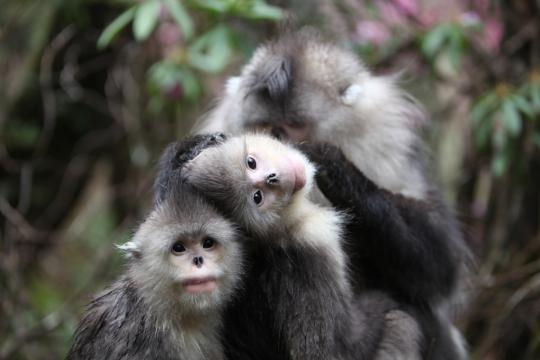
Yunnan snub-nosed monkeys cling to each other at the Baima Snow Mountain Nature Reserve. (XIAO LIN/FOR CHINA DAILY) A protection network for the Yunnan snub-nosed monkey was established in this southwestern province on Monday, marking July 15 as the first Yunnan Snub-nosed Monkey Day, drawing more public attention to the protection work. As the province's first wildlife safety network, it aims to help protect the endangered species through efforts from the government and private groups. The Yunnan snub-nosed monkey (Rhinopithecus bieti) gets its name for its unusual nose - the nasal bones are absent and the nostrils are upturned. Young ones are born white but become gray over several months. It was categorized as endangered in the 2003 red list of threatened species by the International Union for Conservation of Nature. The monkey is now under first class State protection in China. Initiated by the Yunnan Forestry and Grassland Administration, the network currently has 13 members, including the Yunnan Green Environment Development Foundation, the Baima Snow Mountain Nature Reserve, and the Nature Conservancy. The network will be managed by local government sectors and welcomes efforts from nongovernment organizations, research institutes, civil groups and the public. As one of the world most endangered primates, the Yunnan snub-nosed monkey is considered a bellwether species for biodiversity in the high-altitude region, according to Wang Weibin, deputy director of the Yunnan Forestry and Grassland Administration. Since the 1990s, Yunnan has strengthened the protection of the species by cracking down on illegal hunting and smuggling and by designating about 480,000 hectares of land as habitat for the species. In 2011, the Yunnan Snub-nosed Monkey Research Center was launched in Baima Snow Mountain Nature Reserve - its main habitat in Diqing Tibetan autonomous prefecture in Yunnan - to encourage research and cooperation between government sectors and research institutes as well as colleges. As a result of those efforts, the population of the species has grown from 1,800 in 2005 to 2,600 in 2013, according to the administration, which is currently conducting a population survey that it will unveil later this year. Although the monkey's protection has witnessed remarkable success in recent years, it also faces many challenges such as a lack of financial support, poor public education and the conflicts between habitat protection and local economic development. Wang said experience from the protection work will also benefit other endangered wildlife in the region. He is looking forward to learning more creative protection methods through the establishment of the network and promoting those methods to save other species. Cai Wucheng, deputy head of the Diqing government, said he hopes the network will encourage more young people to join in the wildlife protection campaign and contribute their creative methods. "Through promoting sustainable and eco-friendly economic development, I believe more local people will take a more active part in the protection work," Cai said.
|






7740f3b5-9ecb-438e-9052-76cb2d4bb671.jpg)

